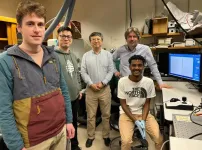(Press-News.org) Engineering Biology for Climate & Sustainability is the fifth technical roadmap developed by the Engineering Biology Research Consortium (EBRC) and represents the first dedicated to innovations and opportunities towards overcoming a significant global challenge. The roadmap targets and challenges are aligned and were drawn from existing climate and sustainability literature, particularly those focused on long-term impacts and opportunities, including reports from the United Nations’ Intergovernmental Panel on Climate Change and the U.S. Environmental Protection Agency.
The roadmap consists of six themes in technologies and applications of engineering biology for climate change and environmental sustainability. Three themes—Biosequestration of Greenhouse Gases, Mitigation of Environmental Pollution, and Conservation of Ecosystems and Biodiversity—focus on technical capacity and novel capabilities in engineering biology to limit further harmful anthropogenic impacts and enable adaptation to climate change, while the other three themes—Food & Agriculture, Transportation & Energy, and Materials Production & Industrial Processes—focus on the development of products and production methods that capitalize on engineering biology to reduce carbon intensity and create sustainable alternatives.
END
Engineering Biology Research Consortium releases roadmap to mitigate, present and adapt to climate change
The roadmap consists of six themes in technologies and applications of engineering biology for climate change and environmental sustainability
2024-03-13
ELSE PRESS RELEASES FROM THIS DATE:
Strengthening the partnership between humans and AI: the case of translators
2024-03-13
ChatGPT and its ability to hold conversations and produce written content have been the focus of a lot of attention in the last year in the field of technology and artificial intelligence. However, AI has been around for some time, helping us in all sorts of everyday tasks, from navigation systems to social network algorithms, not to mention machine translation. Ever since neural machine translation (NMT) systems began to be used on a widespread basis a few years ago, AI has seen exponential growth in its uptake in the translation industry. This has led to new challenges in the relationship between human and machine translators.
Today, the post-editing ...
Milk to the rescue for diabetics? Cow produces human insulin in milk
2024-03-13
An unassuming brown bovine from the south of Brazil has made history as the first transgenic cow capable of producing human insulin in her milk. The advancement, led by researchers from the University of Illinois Urbana-Champaign and the Universidade de São Paulo, could herald a new era in insulin production, one day eliminating drug scarcity and high costs for people living with diabetes.
“Mother Nature designed the mammary gland as a factory to make protein really, really efficiently. We can take advantage ...
Molecular simulations of ammonia mixtures support search for renewable fuels
2024-03-13
Ammonia (NH3) is an important molecule with many applications. The end product of the famed Haber–Bosch process, it is commonly synthesized to capture nitrogen for fertilizers, and is used for refrigeration, in cleaning products, and in the production of pharmaceuticals. Recently, this modest molecule has also attracted interest as a potential resource for addressing one of today’s most pressing challenges — the need for reliable and abundant renewable fuels.
Ammonia is stable and safe ...
First recognition of self in the mirror is spurred by touch
2024-03-13
Most babies begin recognizing themselves in mirrors when they are about a year and half old. This kind of self-recognition is an important developmental milestone, and now scientists at The University of Texas at Austin have discovered a key driver for it: experiences of touch.
Their new study found babies who were prompted to touch their own faces developed self-recognition earlier than those who did not. The research was published this month in the journal Current Biology.
“This suggests that babies pulling ...
Dartmouth engineering team discovers new high-performance solar cell material
2024-03-13
A Dartmouth Engineering-led study published in Joule reported the discovery of an entirely new high-performance material for solar absorbers—the central part of a solar cell that turns light into electricity—that is stable and earth-abundant. The researchers used a unique high-throughput computational screening method to accelerate the discovery process and were able to quickly evaluate approximately 40,000 known candidate materials.
"This is the first example in the field of photovoltaics where a new material has been found through this type ...
Advancing toward wearable stretchable electronics
2024-03-13
Small wearable or implantable electronics could help monitor our health, diagnose diseases, and provide opportunities for improved, autonomous treatments. But to do this without aggravating or damaging the cells around them, these electronics will need to not only bend and stretch with our tissues as they move, but also be soft enough that they will not scratch and damage tissues.
Researchers at Stanford have been working on skin-like, stretchable electronic devices for over a decade. In a paper published ...
Menopause explains why some female whales live so long
2024-03-13
Females of some whale species have evolved to live drastically longer lives so they can care for their families, new research shows.
The study focussed on five whale species that – along with humans – are the only mammals known to go through menopause.
The findings show that females of these whale species that experience menopause live around 40 years longer than other female whales of a similar size.
By living longer without extending their “reproductive lifespan” (the years in which they breed), these ...
Supply chain disruptions will further exacerbate economic losses from climate change
2024-03-13
UCL Press Release
Under embargo until Wednesday 13 March 2024, 16:00 UK time / 12:00 US Eastern time
Global GDP loss from climate change will increase exponentially the warmer the planet gets when its cascading impact on global supply chains is factored in, finds a new study led by UCL researchers.
The study, published in Nature, is the first to chart “indirect economic losses” from climate change on global supply chains that will affect regions that would have been less affected by projected warming temperatures.
These previously unquantified disruptions in supply chains will further exacerbate projected economic losses due ...
The SNF Institute for Global Infectious Disease Research announces new advisory board
2024-03-13
From identifying the influenza virus that caused the pandemic of 1918 to developing vaccines against pneumococcal pneumonia and bacterial meningitis in the 1970s, combating infectious disease has a rich history at Rockefeller. That tradition continues as the Stavros Niarchos Foundation Institute for Global Infectious Disease Research at Rockefeller University (SNFiRU) caps a successful first year with the establishment of a new advisory board.
This international advisory board was created in part to give guidance on how to best use ...
How the brain wakes us from daydreams
2024-03-13
When we daydream, we must be able to snap back to attention at a moment’s notice. Researchers at Boston Children’s Hospital uncovered how our brains can do things like react to a question when we’re daydreaming: firing activity in part of the brain called the dentate gyrus keeps us focused on what’s happening in our environment. And the team found that the same neural activity also helps with forming memories. The findings were published in Nature on March 13, 2024.
“We have found a brain mechanism for breaking up periods of mind wandering and realigning the ‘cognitive ...
LAST 30 PRESS RELEASES:
Cal Poly’s fifth Climate Solutions Now conference to take place Feb. 23-27
Mask-wearing during COVID-19 linked to reduced air pollution–triggered heart attack risk in Japan
Achieving cross-coupling reactions of fatty amide reduction radicals via iridium-photorelay catalysis and other strategies
Shorter may be sweeter: Study finds 15-second health ads can curb junk food cravings
Family relationships identified in Stone Age graves on Gotland
Effectiveness of exercise to ease osteoarthritis symptoms likely minimal and transient
Cost of copper must rise double to meet basic copper needs
A gel for wounds that won’t heal
Iron, carbon, and the art of toxic cleanup
Organic soil amendments work together to help sandy soils hold water longer, study finds
Hidden carbon in mangrove soils may play a larger role in climate regulation than previously thought
Weight-loss wonder pills prompt scrutiny of key ingredient
Nonprofit leader Diane Dodge to receive 2026 Penn Nursing Renfield Foundation Award for Global Women’s Health
Maternal smoking during pregnancy may be linked to higher blood pressure in children, NIH study finds
New Lund model aims to shorten the path to life-saving cell and gene therapies
Researchers create ultra-stretchable, liquid-repellent materials via laser ablation
Combining AI with OCT shows potential for detecting lipid-rich plaques in coronary arteries
SeaCast revolutionizes Mediterranean Sea forecasting with AI-powered speed and accuracy
JMIR Publications’ JMIR Bioinformatics and Biotechnology invites submissions on Bridging Data, AI, and Innovation to Transform Health
Honey bees navigate more precisely than previously thought
Air pollution may directly contribute to Alzheimer’s disease
Study finds early imaging after pediatric UTIs may do more harm than good
UC San Diego Health joins national research for maternal-fetal care
New biomarker predicts chemotherapy response in triple-negative breast cancer
Treatment algorithms featured in Brain Trauma Foundation’s update of guidelines for care of patients with penetrating traumatic brain injury
Over 40% of musicians experience tinnitus; hearing loss and hyperacusis also significantly elevated
Artificial intelligence predicts colorectal cancer risk in ulcerative colitis patients
Mayo Clinic installs first magnetic nanoparticle hyperthermia system for cancer research in the US
Calibr-Skaggs and Kainomyx launch collaboration to pioneer novel malaria treatments
JAX-NYSCF Collaborative and GSK announce collaboration to advance translational models for neurodegenerative disease research
[Press-News.org] Engineering Biology Research Consortium releases roadmap to mitigate, present and adapt to climate changeThe roadmap consists of six themes in technologies and applications of engineering biology for climate change and environmental sustainability





